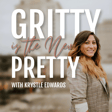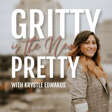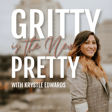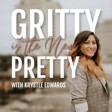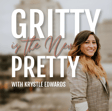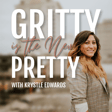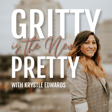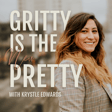Handling Community Resistance
00:00:02
Speaker
Welcome to Gritty is the New Pretty, a podcast by Grit City Women.
Meet Stacy Cernich
00:00:07
Speaker
On today's episode of Gritty is the New Pretty, we are featuring Stacy Cernich, CEO of Good Roots Northwest. Looking for ways to support Grit City Women and keep these podcasts going? Visit our online store at gritcitywomen.com. Welcome, Stacy. Hi, thanks for having me.
00:00:29
Speaker
Of course. Why don't you go ahead and start telling us about yourself? Yeah. Um, so my name's
Founding GritCity Women
00:00:36
Speaker
Stacy Cernich. I am the CEO of Good Roots Northwest. We're, uh, formerly known as the Bonnie Lake food
Starting Nonprofit Work Pre-Lockdown
00:00:44
Speaker
bank. And I started my job in nonprofit in food banking 10 days before the lockdown, which is a crazy time to start any job, but especially as we know.
00:00:56
Speaker
what went on in the pandemic in terms of food security and supply chain.
COVID-19 Challenges and Adaptations
00:01:02
Speaker
It was a wild ride to start then. And went did you have any idea the lockdowns were coming when you took the position or was it sort of this big surprise for you?
00:01:14
Speaker
It was a total, I mean, I think it shocked all of us, right? And then even just in terms of thinking it would be a six week lockdown, you know, gut I knew that that is not what was going to happen.
00:01:27
Speaker
My husband is a biologist and an educator, and he had been tracking it for a while. And he actually brought it up to me um right before I accepted the job and had been talking about this virus. And on the day that I onboarded with my board president, it was just sort of one of those just kind of out of body, you know, sort of moments that you look back on, you know, weeks later. but I had said to him, you know gosh, we don't know each other very well. And I know that I have a lot of work to do. you know The Bonnie Lake Food Bank um had nearly closed down months previous. And so there was a lot of kind of CPR that was going to be needed to the business. And I i said, you know I know I have a lot on my plate, but you know my husband's been following this virus in China. And
Food Bank Struggles during Pandemic
00:02:17
Speaker
I don't know. i mean
00:02:19
Speaker
i I think we haven't worked together very long, but I think we should probably start talking about contingency plans. who And you know he worked in the tech industry and had also been following it. And he said, yeah, yeah, I've been following that too. We should probably um connect on that sooner than later. And it's like in scene.
00:02:37
Speaker
you know like very crazy conversation that we kind of looked back later. Um, and we're like, that was wild. You know, we had had that conversation and you know, the food bank that I was taking on, I knew was not prepared. I'm i'm the daughter of a nurse. Like it was not to take on, you know, day in, day out viruses and you know, contamination. It was in a serious disrepair. It had mold. It had an infestation. There was a lot going on and
Addressing Demand and Workplace Disparities
00:03:10
Speaker
Um, it definitely was, was not prepared for what was, you know, about to come. However, you know, crisis and opportunity are very closely linked. And so the DNA of our story is that that is where a complete reimagining began.
00:03:29
Speaker
The food shortage or accessibility to food is kind of an age-old problem, right? um And so it seems like you really had to hit the ground running. So tell me what you know what kind of things did you have to do to adjust? What sort of innovations did you come up with? How did that look?
Human-Centered Rebranding Journey
00:03:48
Speaker
Well, after the initial cleaning, there was a deep cleaning. you know We didn't have um really any equipment to move the amount of food supply that we would need. Both vehicles and you know forklifts were in serious disrepair. you know I'm from private business. I was just looking at everything like it was a liability. um I started driving equipment. I was too scared to have you know any of our volunteers or my one employee you know, and be on this equipment. And so and quick adjustments had to be made. ah So, you know, we cleaned the building. One thing that I have found, you know, so curious as somebody new to human services, you know, my background is in buying and financial management for a website and for retail. And, you know, in that line of work, especially in high end retail, um your
00:04:44
Speaker
end user or your customer's experience is everything. It's all you think about. You're completely obsessed with it. And I found it so curious that in human services that I was in, that humanity was not considered at all. It seldom considered. And so a lot of this you know reimagining of kind of the existing, um the dilapidated building, the you know um the stigma, the shame, the um the lines, all of those things that you think about, you know spoiled food, you are directly connected to food bank. I started at that point, you know it's a great time to start dreaming when you're like literally ah you know at the bottom. You don't get any worse, right? Yeah, there's nowhere to go but up.
00:05:38
Speaker
Totally. And so I started dreaming about like, what could this be like? If if we could just kind of click our heels, what would this look like? And, you know, incremental and consistent steps really had to begin because, you know, we did not have the funding um to to move forward with all of those things. But keeping that in mind as the North Star and never, you know, you know,
00:06:07
Speaker
never acknowledging that those things might not be possible. you know I really kept that very
Market Rebranding and App Innovation
00:06:12
Speaker
at North Star, and very front and center. But we had to deal with what was in front of us, which was a disconnected customer base, um a very new group of people in huge amounts that um would potentially be coming to this place that was in disrepair for the first time, experiencing food insecurity for the very first time. And so I started thinking about how can we design out of that? How can we literally design this experience where it doesn't even involve this building anymore? Because it really couldn't involve that building anymore. And so engineering, really innovation and human centered innovation is just that.
00:06:55
Speaker
you start from the human experience and you engineer backwards from that point. And so that's um that's what we did. And I remember thinking, you know, the very first thing that we onboarded was an inexpensive app called Avachado. And the um app sign looks like an avocado and that's sort of a speech bubble. And Um, we took, we had an old legacy phone that was like an answering machine attached to it where you'd have to rewind the messages sort of situation. And I, it it filled up in, in, as soon as the lockdown was announced, our.
00:07:35
Speaker
Our voicemail was filled, people were circling the buildings.
Community Empowerment through Technology
00:07:39
Speaker
It felt like chaos, but technology can instantly connect people, especially in a what we experienced. So this app allowed us to text immediately from the cloud back and forth to our customers, any language. So the central focus of that you know design and how we engineered backwards was this notion that I could not get out of my head, that people that were experiencing food insecurity for the very first time were going to have to call a stranger on a landline and say it out loud. And I don't know if you've ever had to say something to somebody that create you know was deeply painful and shameful, but the trauma of that moment where you have to say it out loud You often choke over it. It is so difficult to say. And I thought, could there be a way that that didn't exist? That nobody had to tell a stranger or tell, you know, potentially, you know, I've lived in this area for 20 years. It could be somebody that I know that had to write talk to me about these things. And um so this app completely changed that.
00:08:58
Speaker
You know, people could be anonymous. They could talk to us in any language. And if we had to send out mass, you know, broadcasting, this was really a mechanism of emergency management. I knew that I could text broadcast to them in any language in 30 seconds. And so height of the pandemic when we had 4,000 vulnerable families up here on the plateau and a fire broke out.
00:09:26
Speaker
you know in a suburban area, which you have, you know, our state has never seen anything like that. And here, Bonnie Lake was on fire. Talk about compounding trauma. This was in the first few months of the pandemic. Right. We were able to evacuate. And while I was evacuating our building, um I was able to text 4,000 of the most vulnerable families in any language that it was going to be okay. And that I would get back to them in 48 hours.
00:09:56
Speaker
And like, that is powerful. You you know, that is a game changer and it absolutely connected us to, you know, our community um in a digital way, but it needed to be.
Technology and Trust in Underserved Communities
00:10:09
Speaker
he That's incredible. That just, it kind of gives me goosebumps a little bit because so often and In industries where there are underserved communities or um it could be like a nonprofit thing and definitely I'll say in government systems, the end user.
00:10:32
Speaker
is not taken into consideration what that experience looks like for them utilizing the service. um And that's one thing that has been really important to me in my career and everything I do is who is going to be using it? Is it going to do what it needs to do? Is this process system tool, whatever, going to do what it needs to do? Is it going to um meet their needs, is it going to make them feel good about using it? Because if you implement something or you buy something and you're locked into this thing and you don't have that feedback from them, you don't have that sort of human centered approach to the problem, it's not going to be as successful as it can be. And so I think that that approach of
00:11:30
Speaker
thinking technology can actually work and not being scared to do that, not being scared to say, you know what, I'm just gonna text 4,000 people. No big deal. Like, i you know, if if if I were to think about that, you know, I could think of how many approvals, right? Certain groups or certain organizations would go through, like we have to go through all these approvals, but you to have that accessibility to communicate and build that trust,
00:11:57
Speaker
quickly, I think that's so valuable. And I think it's definitely something, you know, other organizations should be like interested in as moving forward, especially with large groups. Well, and I think there's so much fear of failure.
Innovative Organizational Culture
00:12:12
Speaker
And we are an agency and a group of people that are, you know, so committed to our customer and their experience that failing forward is worth it every time.
00:12:23
Speaker
who sorry And you know people often will you know talk about um a customer base or a demographic that might be experiencing something, whether it be situational or ongoing, that requires resource and refer to that group of people in a deficit narrative. Somehow that, and and i I love to counter those narratives and say,
00:12:48
Speaker
So in every aspect of this person's life, they're interacting with technology. And you think in food resource specifically that that's going to throw this off when, when technology is utilized at the library, at the post office, at the grocery store, that, ah you know, probably at where they work two to three jobs.
00:13:10
Speaker
that somehow in the resource industry and that that deficit narrative, you can, you know, it is woven tight throughout systems. So tight and it is protected by not the people that are being served in the system. It is protected by you know those that are designing and participating on on on that end. And so, you know, when people would say, text broadcast, and I'll say, your dentist has brought been broadcast texting you for at least a decade. What your ah list has been text broadcasting you for at least a decade, what would make you think that there is something so hard to decode here? and You just blew my mind with that. it's So you're so right, you know, and I just, it
00:14:04
Speaker
You're 100% correct in the fact that that hold back is within the systems and within the people running the systems. I agree with that. And that's one of the reasons why I transitioned to my career is to become a change manager.
00:14:18
Speaker
because we have to be challenging some of those thought processes and saying, okay, maybe it's a risk to some extent, but the benefit will outweigh it. And if we, we can't walk through trying to innovate change for good causes, being scared of change. And I think a lot of times it's because they've had failed change in the past.
00:14:43
Speaker
They haven't been able to communicate it properly. They haven't been able to make sure the internal preparations
Overcoming Self-Doubt
00:14:49
Speaker
are made for their staff. And so the change just feels scary and it's easier to say, it's a barrier. We're not going to do it. Yeah. No, it's hard. And there are administrative casualties when strategic risk is taken.
00:15:05
Speaker
And those are difficult. Sometimes those are people and processes and all those things feel just too much and too overwhelming that people will you know not just run from it, but sabotage more often than not. And so you know creating environments and workplaces where you know change and innovation and new ways of thinking are the norm is really helpful because then it really some of these, you know, huge shifts and moves that we make on a on a Tuesday do not seem like a big deal anymore because that that is the norm. That
Personal Resilience in Nonprofit Management
00:15:42
Speaker
is what we're doing. And I think um you know part of that culture shifting is about really um absolutely committing as an organization, as a group of people that
00:15:56
Speaker
the experience of the customer is at the forefront of our minds always. And so with that, we are willing to humble ourselves through um failures um or or first tries or or however you want to say, and we don't even call things problems anymore. In our culture, we call it a puzzle because everything is solvable. In some ways it is. And it's interesting how words can really, you know, they can really dictate how people react. yeah Words are very important. And how you frame something, calling a problem a puzzle is really, really helpful when you're working with a group of people and pushing through um discomfort. And, you know, even um I had little catchphrases that I will say to our team, like, I'll go,
00:16:54
Speaker
This is when ordinary people would quit. It's a good thing we're not ordinary. And just remind everybody, we are extraordinary for moving forward without fear. Or, um you know, i'll oh I'll say this is situational discomfort. but going This feels uncomfortable right now because it's changed. So just acknowledge there's a little bit of discomfort, but it's situational.
00:17:23
Speaker
and the gains are so big on the other side,
Embracing Discomfort for Growth
00:17:26
Speaker
we don't want to miss out. Yeah, man, I want to work for you. You got to pollinate you got to keep pollinating all of these places. Yeah, I mean, and that's just keeping the morale of the team up and and it's a great way to do it.
Witnessing Good Roots' Transformation
00:17:43
Speaker
And so you were able to step in and a very crazy time during COVID and take over the food bank that was essentially in shambles and then you built this connection and now where is Bonnie Lake Food Bank at now?
00:18:00
Speaker
Yeah, that's, you know, a wild story and it happened in the span of six months, honestly. And sometimes moving quickly um really shortens that that discomfort. And that was the goal for me to really get us moving forward, um you know, tell that story of that change and just kind of rip the band-aid. Let's, you know, we knew we didn't want to be in a ramshackle building. We knew that.
00:18:25
Speaker
And so with the text broadcasting and all of that that digital relationship that we were forming with our customer base, we were able to shift our model to 100% delivery. And when I say delivery, I mean a car on the side of the road in green water out in the middle of nowhere on the way up to the mountain, or a multimillion dollar home on Taps Island tap silent and a golf course. And everywhere in between, the pandemic was a great equalizer And with great trust and dignity, um you know we had to move forward with our customer and have them tell us the one thing that they could really you know have be a secret, which was where they lived, where they lived.
00:19:10
Speaker
and you can go to a food bank or you can ask somebody for help, but you don't have to have them try for a step. And so we handled that with great care. um My ah delivery vans were white when we were able to afford vans and get grants and kind of improve our circumstances. I kept them white, like Amazon. And so when we were going into these places, I don't want somebody to be embarrassed whether they live in a car or a McMansion.
00:19:37
Speaker
put You know, I really, um so with great dignity and respect, that is how we rolled our are delivery route. And it was 1800 stops a week. It was huge because with access comes scale. And that's a concept in nonprofit that there are also i invisible barriers that are created to prevent the nonprofit from scaling to a point um that gets uncomfortable. It is very uncomfortable to grow very, very quickly.
00:20:14
Speaker
Any business can tell you that, whether you're for profit or nonprofit, there are things that you have to deal with in an environment like that, that are extremely challenging, that are a head trip for administration and nobody wants to nobody wants to deal with that, right? like It's really hard. It's much easier to create barriers to access. And um and so that is the more common story that you I, because I had not run a nonprofit and really did not know about that from private business, I know how to scale to meet demand. And so without knowing it and without understanding that that was what was happening um and that we were a little bit unusual in how we addressed that, we grew by, you know, triple digits.
00:21:05
Speaker
wow on top of triple digits, on top of triple digits. And all of a sudden we emerged six months later as a regional food bank. And um we found a piece of property that was for lease out
New Property and Renovations
00:21:19
Speaker
in the middle of rural unincorporated Pierce County. It's a farm, a traditional farm. it's ah There was nostalgia. It was a pumpkin patch and a corn maze. And the marketing part of me was like, oh man,
00:21:35
Speaker
You cannot, no money can buy nostalgia or that, that feel good. That feeling, right? Of just like, Oh, I picked up my pumpkin there. I have pictures with my kids there. I had a great time there. um And so it just.
00:21:54
Speaker
We couldn't afford it, honestly. We couldn't, um it was bold, it was risky. It was all the things that most people would run from, but I knew we had to do it. And so we took a leap and it worked out. We started renovating design on a dime. It's a beautiful farm building. It looks like Chip and Joanna Gaines stopped by. you Oh, yeah it's beautiful.
00:22:22
Speaker
Well, it was you know it was done with a lot of sweat equity and and help from from local folks around here, businesses that stepped in. and Distributors helped us with those doors so that we could have um you know ventilation and be able to have an open shopping space. So while we had all you know this delivery route, we were busy very quickly renovating a building in like three months.
00:22:49
Speaker
And um we kept that delivery route through 21, mid-21, and then we opened our doors. And it was you know kind of like a metropolitan market experience for our customer. It was this the true like Hail Mary that we wanted to show the community about what it would look like to reimagine something.
00:23:17
Speaker
Yes, I've seen pictures of it and it's beautiful. and i think that um idiot Yeah, I need to come and visit it. It's fabulous. And I just can't imagine doing all of that in three months while growing towards a regional food bank. So in that process, well, first let me back up. I have one question. So you did say that you guys couldn't afford it.
00:23:44
Speaker
How did you get funding for it? How did you pull that off if you don't mind sharing? Not at all. I'm super transparent about that because I think like in order for other people to take risks, you need to understand, right? So we did a mini relocation campaign. We knew that what I didn't want to have happen was have people give money that couldn't afford it during that time. We were heading into, I mean, just like flashback, remember the summer of 2020? It was crazy. And so we did this mini campaign. We all in, um by the time like in kind things all read, you know, heating and donated an HVAC system. So all in, we were able to make just around $50,000.
00:24:29
Speaker
And that Boone Electric came in and ran um ah you know additional power so that we could actually run our equipment. So with with that kind of support, on infrastructure, and I you know mentioned how distributors did that, we were able to do it. And I think you know we cast a vision. We spent a little bit of money on a video, which people can go back and look, and it was called Rooted in Community. This was long before I knew we were going to rebrand.
00:24:58
Speaker
to good roots, but the video on YouTube is called Rooted in Community and it really described our intentions. And through rendering, we showed what we wanted to do. You know, I did not think that we would be able to accomplish it so quickly. and But once it's, it's interesting what forward motion will do. Just do it anyway. It starts to build momentum. And I really started to think about, you know, in a typical nonprofit situation,
00:25:32
Speaker
you know you're oftentimes you know talking about the need and really talking about your community from a deficit perspective, what your community's lacking. And I reversed that campaign about imagine what we could do, though. That was kind of the the vision cast was like, we're not going to tell sad stories. Not now. I mean, how much how much's more painful you could this all be? So I didn't really emphasize all of the deeply traumatic things that were happening. I was really talking about this is what's happening when you show up, and workers are helping neighbors, and this is what this could look like. And I remember telling our board and our team, look, we just went through a horrible summer. So much trauma was happening. The wildfires had happened.
00:26:28
Speaker
you know, Black Lives Matter, everything was, it just felt, oh God, it's so painful. yeah um I remember telling my team, the kids are watching us. Our children, our children in our communities are watching us. And what do we want them to know? right What do we want them to remember about this community?
00:26:57
Speaker
Um, because we know that what they've seen on the news, we know what they experienced. What do we want them to know about resilience and character and rebuilding and what that could look like? Because I know they're watching and gosh, you know, that becomes more and more apparent to me as time goes on. And I get further away from that moment. Young people were watching us. Yeah.
00:27:26
Speaker
Yeah. And that's a campaign that you can't compete with, right? And it it is, you know, in terms of, and I don't mean compete financially because I'm obsessed with how people feel around our project. No matter how you're interacting with it, I'm upset. Even if you're driving down the road and you see it, I'm obsessed with what your impression is going to be. who It's incredibly important.
00:27:50
Speaker
Yeah. And so that was what I really, whether so that anybody gave me a nickel or not, how we handled that moment.
00:28:02
Speaker
and how that made people feel as we were handling that really meant something to me because I knew that the return on investment would be tenfold if we didn't lose sight of what was most important. and And those are critical times, right? Like believing, you know, you might not get all the money that you need to do what you need to do, but you are setting a foundation um And you can't really go in and undo those times. And so I knew that ah I was in that moment with our team and with our community and that together we could do it. We could build what we needed to build.
00:28:45
Speaker
That's an incredible story. I am so enamored by just your leadership honestly and how you're able to motivate people in such a difficult time to really tackle a problem in a new way. That's such a difficult thing for most leaders to do. And just the dynamic um way in which you've done that, it's very impressive to me. So I really appreciate you sharing that.
00:29:15
Speaker
your story with Grit City Women, and um I've learned a lot of good taglines that I'll pull out one day when I'm trying to get everyone excited about something. um so And I love the word grit. I use that a lot. I i had a pin that I would wear, a brooch, and i had I have since given it to a politician that needed it very much in ah a very hard time. um But I wore that grit pin. in I would tell, you know, because the thing about it is a lot of people think that when people move forward like that, and when you say you're an aberrant, I think, you know, that, um that is so lovely, and i I accept it. But I think about that person that was moving forward. And that was not somebody that was completely confident in them for going to work out, right? Like, I had a lot stacked against me, and I knew it. And I think, um
00:30:12
Speaker
You know, I did a lot of, you you know, self-talk and, you know, and I talked a lot to the team about now here's the thing. Nobody's ever seen a food bank that was fancy in, in probably in the state, but definitely not in our County. They have now not seen a a fancy food bank. Now people are going to be confused by this confused and they might say things about me. And what I want you to know is that's okay. And if people say something about you or why are you needing to do something fancy? Do you think people are just going to,
00:30:42
Speaker
nobody's ever gonna wanna pay for their own food if you make this great experience. And I i was preparing everybody almost like um I would mock some of those moments, like do kind of a mock trial. Like here's what people might say to you when you're at the grocery store. Like here's what might come out. We might have people visit here that might say this, but here's the thing, you put the blame on me. You say, oh, that's my crazy boss, right? That's my crazy boss. And she just has this thing and she just, and she worked at Nordstrom.
00:31:11
Speaker
ah And I was like, you don't have to take responsibility for any of this. You tell them it's me. There will be a time. We're going to say some things. We're going to say some things that people aren't used to hearing. And when they're not used to hearing things like we need to have dignity and respect and we need a place where kids can walk in and never know they've been to a food bank and everybody deserves that. And food is a right. Those are new things. So we need to give people the space to digest that. And women do that.
00:31:41
Speaker
They might say some things that don't sit right right. But just know they're processing. We have this vantage point to process it in real time. Not everybody has that. yeah And we're going to feel alone. And i I told them, we're going to feel alone. Like we know a secret that nobody else has figured out yet. And that's lonely. There is an aloneness to knowing these things.
00:32:12
Speaker
but people will figure it out and we won't feel that way for very long. But the trick to like saying things that nobody's ever heard is you have to then be brave, even when you feel brave, be brave. It's really important that you just, you know, say whatever you need to say, be brave in that aloneness and you will get through. And what's on the other side is incredible. We know that our community deserves that. So let's be brave. And you know, it was,
00:32:42
Speaker
it It worked out. Yeah. Even I am like, but it worked out. You did it. Yeah. Yeah. I mean, you prep them to manage resistance, you know which is something that we don't do either. And it's another thing in change management that they focus on. It's what kind of resistance are we going to get from the community, from others around, from our team? And how do we talk about that? How do we address that? And so, I mean,
00:33:09
Speaker
ah you You just have such an intuition for those conversations in advance and prepping the team for it, which is fabulous. And you know the isolation that you feel when you're driving a project forward, that's exactly why I started Gritsitting Women was because when I started Liz Rocks um with a group of friends, I had zero experience doing any sort of fundraising, any sort of nonprofit.
00:33:37
Speaker
And I found myself in this position of leading a team, building websites, doing marketing, doing fundraisers, getting fiscal partners, um, applying for 501c3 nonprofit. And, you know, I didn't feel like I had anyone to connect with. And then sometimes my own team, I think was just like, um, sure, you know, you're kind of crazy, but you know, we'll help you. And, you know, so just even feeling alone in that sense and.
00:34:05
Speaker
I'm wanting to find connections with other women that are experiencing some of those situations or can give guidance. And that's why it was so important for me to start Grit City Women. And then, you know, it really speaks to the name like Gritty is the New Pretty. and love it I love the slogan so much. It just really redefines.
00:34:27
Speaker
um I think like what it can mean to be a woman, even, you know, and it's that that grit can really be a beautiful thing and get things done and do good things for the community and help drive success. And so I'm I'm very, very in awareness of how isolating that can be. I guess I don't try it, but the emphasis of also being a woman through that So there were so many things that we were doing that I was getting questioned about that I really did not feel like the the type of humanitarian work that was being conducted at the scale that it was being conducted and yet to still be asked questions, um you know whether it be by a decision maker or somebody representing a larger group in some way or somebody representing a a company or an organization that I was getting a lot of questions about something that was delivering ah ROI, had a stats and figures that was being managed well, that was so you know most importantly, you know, meeting a need. And a lot of people became very preoccupied with poking holes in that. I don't think it would have happened if I was a man.
00:35:52
Speaker
the numbers would have been there and that would have been it. That would have been it. And so I had to do a little more tap dancing around that. So, you know, a although I wouldn't change a thing and I am not bitter or, my um you know, jaded, I am very aware that my approach and my deliverables, um,
00:36:20
Speaker
have to be curated in a way um that is digestible to to a wide audience. Yep. Yep. That's one thing that I think can be difficult for women to navigate sometimes. I mean, I came up in a male dominated industry and um i I had a coach and to help me navigate some of those situations. And so I think that that,
00:36:51
Speaker
That is very true and you have to be brave and you have to just recognize that sometimes um you are going to get questioned and you know what? That's fine. Bring it. Bring the questions. Yeah. And I think for me, what I'm realizing, you know, now, because I had worked in an industry that was 90% female dominated.
00:37:13
Speaker
And so this was contrasting for me to you know sort of being in in more of a general population with everybody, it very different than Nordstrom. And so um you know I think the level of decisions that I was making during that time, which were you know emergent and um they were uh, tactical and strategic and all of those things. Um, I think, you know, I give grace and that a lot of folks aren't used to seeing a woman do that very. And so it really is getting used to something that you don't see very often. And that is when more questions come up. And I think, you know, I'm happy to answer all questions about that. And, you know, know that young girls are listening
00:38:09
Speaker
and I want them to hear and and I am at the same time hopeful that they don't have to answer the same questions when they are in my position, right? Yeah, yeah. That makes a lot of sense. But I want them prepared. ah Yeah.
00:38:27
Speaker
Yeah, absolutely. You mentioned that um there's the rebranding from Bonnie bony like food like bank to um Good Roots Northwest. So can you tell me about how, when, why that decision was made? Because I think a lot of businesses or even personal brands go through some transitions and rebranding can feel really scary. And I think you were able to do it really successfully. So I'd love to hear more about that. Well, thank you. It is it is hard when somebody knows you as one thing. And we've had a little bit of a sort of ah a soft lunch of that, because when we moved out to the farm,
00:39:12
Speaker
I didn't want to call it the Bonnie Lake Food Bank. We have a Bonnie Lake address. We were in Pierce County in the epicenter of who we served. And we became more regional um in a very short amount of time and such a short amount of time that it would would have taken the public a long time to kind of figure that out. Like it was a process and everybody was, it was a pandemic. Nobody was worried about my brand, right?
00:39:38
Speaker
But I knew in the short term before we really went through i you know and could afford i you know to to completely rebrand and change the website and do all of that, that in that interim time that I needed to call the project something. So when I speak about our business, our nonprofit business,
00:40:01
Speaker
the activities that are happening are projects that we're working on. And there is a part of that that is helpful for my team to think that we're working on this project together. There's a togetherness about it. And it's also like for our customer base to know this isn't a deficit narrative where we're creating a charity to help you.
00:40:20
Speaker
We are working on a project. It's a food security project and it is multifaceted and um it's for all of us. Securing food is an all of us thing. And so we're all working on this project together. So the market became a project.
00:40:39
Speaker
It was still under the umbrella of the Bonnie Lake Food Bank, but it helped me kind of soft launch into a new identity um without having to completely rebrand. And so the project of the market was successful. It um you know had a new image and and really from the very human aspect of it, you know I had a customer that has a disability, their husband has a disability and and they have been customers long before we moved out to the beautiful farm. And i when she pulled in for the first time ah that July, because we had been delivering to her this whole time. And when we opened on July 1 of 2021, I met her out of the car because sometimes she's not able to you know walk into. And so I met her out of the car to kind of chat with her and said, Oh my gosh, I am so excited for you to see the space, but I am equally excited, you know, to take your order here at, at curbside, if that would be a little bit easier today. And she said, Oh, you know, my husband is going to shop today and that's going to be okay. But I have to tell you that that sign up there and we had put our sign that said the market, that sign kid, that means a lot to me. And when people, um,
00:42:00
Speaker
I can, you know, you can kind of tell when somebody is going to tell you something that's raw. And I like to not um clutter that with more words. And so I just paused why she said that and waited to see what else she would say. And she said, you know, it means a lot to me because in all the years that I went to the Bonnie Lake food bank, I would have to tell myself on the drive there.
00:42:26
Speaker
You're just going to the free grocery store. You're just going to the free grocery store. And today, I got to drive here and say, you're going to the market. Wow. So that meant something. no you know ah For no other reason other than that woman telling me that, I would do that over and over again, right? No, let me tear up.
00:42:51
Speaker
i it you know it it needed to change. project have its own name That project was so much bigger than the Bonnie Lake Food Bank, it had to have its own name. yeah And so that worked out great. But then, you know, the Bonnie Lake Food Bank was really ah you know doing us a disservice at that point. It it really kind of pigeonholed us and said we're part of Bonnie Lake and that's all you serve, which hadn't been the case for years. We had been serving all of the plateau and down into the valley and you know doing a lot of different work, working with local agriculture. um And that new approach needed a new name. And it took us a year. And you know it took us a year to make the money for it too, um to make those investments.
00:43:35
Speaker
and do it $5,000 at a time. And we staged that out with hemisphere marketing in Tacoma. We really staged that out into a phased approach so that we could you know do the customer facing part, you know do the part that really meant something um to the people that we served, which is the most important part about the project. But then from an administrative and just you know an agency standpoint for us to you know, write a grant and say the Bonnie Lake Food Bank no longer told the story. And we were spending so much time explaining how we weren't the Bonnie Lake Food Bank. It was so much more than that, that it just became comedy, you know.
00:44:22
Speaker
We had to change it. And so, you know, when you look at the logo and the logo, we spent a lot of time in on, you know, good roots. We really wanted to wink and nod to the common good and to being rooted in a community. And and roots also winks to a lot of things, resilience. You know, when the roots are deep, there's no reason to fear the wind. um But it also nods you know to the agriculture, which we feel so strongly is part of securing food.
00:44:52
Speaker
And that is part of our business model. So the the pieces of our logo, you know, the sun is about um its future casting. It is bright and positive. And there's fields that that link to agriculture and, um you know, there's growth ah of something new popping up.
00:45:15
Speaker
And that was our organization kind of popping up. And and then you can see the roots and a ah leaf, which is really you know symbolic of our community and and the strength to grow something. And so that you know it needed to have a story. The logo itself needed to have a story. It wasn't going to be something generic. And um we took the plunge, man. It was something.
00:45:42
Speaker
you Well, you carried that vision through from, you know, the very beginning, right, all the way to the little details. And that's definitely something that I talk about a lot is like when you're sharing your vision or, you know, whatever project.
00:45:59
Speaker
those details do matter how you talk about it how you present it to people how you share it with people your how it looks how it feels all of that matters and i think sometimes we can get really wrapped up in the technical stuff and the business the you know the back end business side of things and essentially miss out on some of that really key customer service business marketing and people focused, you know, vision. And so it's, it really shows that you push that all the way through to every detail. And it is helping people feel like food accessibility isn't something that's as shameful to them that might have been in the past, right, that it's accessible to them, and they can be somewhat normalized. um So I think it's amazing.
00:46:51
Speaker
And I appreciate you sharing your story. Thank you so much. So what would be your biggest piece of advice or biggest lesson learned that you want to share? You know, I have a couple and i' andnna i'll I'll go with one that um I had to tell myself a lot about this, um you know because when you're doing new things and saying new things and um really having to you you know be brave with your intentions and your words and all of that, that it's really easy to kind of gaslight yourself and come up with this deficit narrative for yourself. ah You're trying to avoid it, right? You're trying to avoid it outwardly, but internally,
00:47:38
Speaker
Um, it can really, it can take you down and, um, you know, I started to develop sort of a strategy of where I would look at like more evidence-based, um, aspects of my work that.
00:47:55
Speaker
you know Because it would be easy to say that somebody that was you know a ah fashion buyer that you know worked at a website that really didn't have experience in politics or nonprofit sector, you know even fund development, any of that, that it would be easy to say that I was you know going to fail and tell myself to fail.
00:48:17
Speaker
that there was evidence ah to suggest um that I would need to remind myself that maybe I wasn't failing and that the narrative I was starting to create internally for myself, which is, you know, it was super, um it's really hard sometimes to pump yourself up, but I would say, you know,
00:48:37
Speaker
There is evidence to suggest here that I do not need to be an expert at something to be the best at it. And then it might in fact be that I am not an expert in the subject matter that will move this project forward beyond what even I can imagine. I can trust that.
00:49:00
Speaker
if I'm willing to do that, if I'm willing to trust myself in that. And I would start to build up evidence that would suggest that that might be the case. Because i it i it wasn't enough to just sort of be like, you are the best. You you can't like look in the mirror and go, you're the you don't have to be an expert. You're still the best. no I was starting to sort of build my own case on that.
00:49:22
Speaker
and you know that for the people around me that we we didn't need to be formally trained in this to be the best. We didn't need to be an expert. We didn't need to even have any experience in this to to succeed and that it might be to our best advantage and an innovation being able to pollinate from other industries and bring all of that collective knowledge together would be our competitive edge if we treated it like that versus you know sort of this, the deficit, right? I also, during that time, I don't think that any of us ah arrive in nonprofit careers because we have been unscathed in life, that we have floated through life somehow. There is something that built up the capacity to show up for other people
00:50:19
Speaker
And that is earned. And so throughout my life and my other career, and I i would see that thing that I had, that damage, trauma, whatever, the you know all the words that you will call those things. ah I saw that you know as my disability. i almost I almost treated it like my disability that, oh, if I didn't have X, Y, and Z experiences that I would probably be X, Y, and Z. But I have that. So it's probably not going to happen for me. And there was a moment, you know, a year into this pandemic where I realized that that thing was a superpower.
00:51:15
Speaker
It was what gave me the capacity and the resiliency and even the ability when you're in a really difficult spot, it is a heavy, heavy, heavy subject matter when people do not have enough food. That whole thing that we somehow accept in our society, um the knowledge that not everybody in our communities can afford to eat, that thing on the front lines is very heavy.
00:51:42
Speaker
and my life experiences allowed me to somewhat compartmentalize that and move forward on the better plan instead of letting that take me down. And in my past life, I saw that as something that held me back. In this, I saw it as the only thing that would allow me to succeed. And it seems it changed how I felt about myself.
00:52:13
Speaker
And I only say that not because, oh, I, you know, crack the code. I say that because I know so many women feel like walking wounded. And there might be a chance that whatever that thing is, if you lean into it hard enough, and I'm talking uncomfortable hard, that it might be the thing that could bring you the most joy. who who The opportunity.
00:52:42
Speaker
oh Yeah, absolutely. Well, thank you so much again for sharing such great insight and great tips. And I mean, i I feel like I learned so much. So I'm excited um to share this with others. um Thank you so much for joining us today. Of course. And please come visit me and anybody interested in seeing what creativity and um just kind of wholeheartedness looks like. um You can look us up at goodrids.org.

